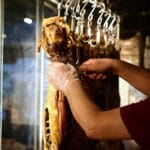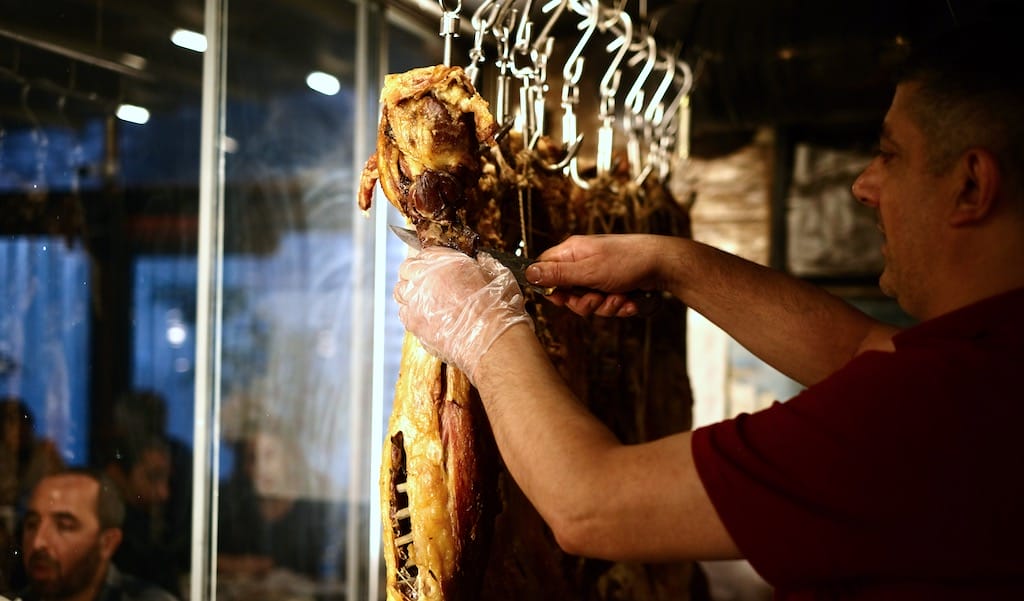Mtkvari, the local name for the Kura River, divides Tbilisi. Until the launch of Fabrika – a disused Soviet-era garment factory turned into a trendy social-space-cum-hostel in 2016 – few gentrified souls from the city’s fancier shore crossed over to the left bank.
Fewer still stepped out further than the central Marjanishvili neighborhood, making it past Dezerter Bazaar – the throbbing gastronomic heart from where most of the city’s fresh produce and meats originate.
This is also where Leonid Chkhikvishvili buys fresh cuts of meat each morning for his restaurant Duqani Kasumlo, located even further north on the left bank in Didube. Here is a neighborhood where few travelers tread, except perhaps to quickly pass through to catch cheap intercity mashrutkas (mini-buses). But despite its overlooked location, Duqani Kasumlo has acquired semi-cult status for its kebabs in an area better known for its cluster of home improvement stores and the labyrinthine Eliava market, home to hawkers of used car parts and construction materials.

Although the market borrowed its name from the famous Eliava Institute of Phage Therapy (the use of viruses to treat bacterial diseases) that hovers on a hillside on the opposite bank, Eliava market has long superseded the institute as a landmark for city newbies. However, spend enough time in Tbilisi and you’ll quickly learn about George Eliava, the famous scientist purged by Stalin in the 1930s who, before his execution, helped launch the institute as the world’s first dedicated to researching phage therapy. It’s research that is currently being revived in the West as potential treatment for antibiotic resistance – but that’s a story for another time.
“This is a restaurant for the working class because we’re so close to Eliava,” Leonid tells us. “But our kebabs bring visitors from all walks of life.” The ground-floor restaurant is located in a corner of Didube Plaza, a shopping complex that also houses a sprawling Turkish supermarket and a hodgepodge of stores specializing in lighting fixtures and door knobs. The restaurant has no English signage and one has to read Cyrillic or Georgian cursive font to find its name. Its cheerful interiors, full lunchtime tables and the tantalizing smell of fresh grilled meat floating out are what first drew our attention while on a DIY home improvement shopping trip in the neighborhood.
The second thing that struck us was the number of lamb items on the menu, something rather uncommon for a Georgian lunch hub, which would typically feature more beef and pork. Every table around us had lamb kebabs, an obvious house specialty. so we followed suit. When our food arrived, we were bedazzled, the kebabs garnished with thinly sliced onions and laid out on a bed of lavash flatbreads. They were placed atop a pretty chafing tray with a charcoal brazier below.

Next to a side of charbroiled tomatoes and chiles was a generous serving of sumac to sprinkle on the kebabs. The presentation called for some delayed gratification as we felt compelled to whip out our phones for some Instagram-worthy shots before tucking into the juiciest, most tender kebabs we had tasted in a long while.
A quick Google search of the restaurant (which required typing the name in Georgian script) showed us a 4.8-star ranking and numerous rave reviews. We hadn’t stumbled upon some undiscovered place; we were just late to the party. We left thoroughly satisfied, vowing to return and lay questions to rest about the kebab plating style, which we had only come across before in Iran and Turkey.
On our next visit, the friendly waitress hollered over to the patroni (boss) to answer our inquiries. “This is an Azerbaijani-Georgian fusion restaurant,” Leonid quickly announced, before launching into the story of how it came about unprompted.

Along with other minority groups from neighboring countries, ethnic Azerbaijani speakers – who are predominantly Muslim and some of whom trace their history in Georgia as far back as the Seljuk invasions of the early 11th century – have long-settled in certain regions of Georgia, much before both the Soviet and post-Soviet era borders of the South Caucasus countries were defined. The Azerbaijani-speaking community in Georgia today have descended from waves of migrations of different Turkic tribes across the centuries, including the Kipchaks move from the North Caucasus and the resettlement of other Turkic-speaking tribes in Kakheti during Shah Abbas’s rule in the 17th century. Today’s Azerbaijani ethnic minority, who form about 6% of Georgia’s population, are scattered across different regions of the country. The municipality of Marneuli, about 70km southeast of Tbilisi, is one such Azerbaijani speaking stronghold.
“Everyone in Georgia knows Azerbaijanis make the best kebabs, and there was a place we knew in a small village called Kasumlo [in southern Georgia] that served some of the tastiest ones,” continued Leonid. “That was a proper duqani…with mud floors and not very clean, but we’d drive out whenever we could to eat there!”
Juicy lamb kebabs grilled by the in-house Azerbaijani-Georgian barbecue master might just be the reason to visit this overlooked blue-collar Tbilisi neighborhood.
While duqani is a borrowed word from Arabic that means “shop,” in the modern Georgian lexicon it mostly refers to a small, cheap tavern serving hot meals. Worth noting is that the name has been increasingly appropriated by a number of upscale restaurants on the right bank.
“One day, my friend who’d mastermind these trips decided, why not bring one of the cooks from Kasumlo to Tbilisi so we don’t have to drive so far each time we crave kebabs?” That’s how Duqani Kasumlo opened up shop in early 2016.

It turns out Leonid’s mastermind of a friend is a well-known local folk singer, Lasha Glonti. He and his fellow Kasumlo-kebab chasing friends now co-own and manage three other branches of Duquani Kasumlo, which all followed the flagship restaurant that Leonid now manages.
“Tbilisi elites like the Saburtalo branch, where it’s more stylish and comfortable. Our third branch is in Saguramo. That mainly has weekend visitors. But this place is like home for our regular customers, who work in the shops around here,” he tells us. Each branch has an Azerbaijani-Georgian in charge of the kebabs and other grilled meat, including the equally succulent lamb ribs and Georgian pork mstvadi. The barbeque chef at this joint shyly introduces himself as Idayak, or Idy for short, and declines to give us his recipe, announcing it’s a trademark secret. While the religiosity of local Azerbaijanis may vary – and most have grown up closely with their pork-consuming, fellow Georgian citizens – Idy does tend to the fire for the pork mtsvadi on the far end of the grill, in deference to those who might adhere more closely to the Muslim faith. The waitress takes charge of getting the meat off the skewers and onto the plates.
Other Azerbaijani dishes include buglama, a thick lamb soup with bell peppers as the base, although the main specialty soup is the khashi, a tripe soup ubiquitously voted as the best hangover cure by Georgians. “Our khashi is served fresh and hot daily, from 10 o’clock in the morning – the only time you should have it,” declares Leonid, who dissuades us from trying leftovers of the garlicky soup as we linger over remnants of a very late lunch.
While kebabs are certainly the star of the place, we muse on whether the secret to thriving in a blue-collar neighborhood in a country where wine and chacha flow freely just might be a daily hangover cure, served up each morning before the kebabs start grilling at noon. We plot another return to test out this theory.
 September 2, 2022 Kutkhe: Khinkali Corner Shop
September 2, 2022 Kutkhe: Khinkali Corner Shop
No neighborhood is complete without that friendly corner shop that often provides the […] Posted in Tbilisi February 2, 2022 Meat Palaces
February 2, 2022 Meat Palaces
Ask anyone from the Eastern Turkish city of Bitlis where büryan kebabı comes from, and […] Posted in Istanbul July 5, 2021 Salobie Bia
July 5, 2021 Salobie Bia
This story starts with a hamburger, a juicy, perfectly grilled patty between a pair of […] Posted in Tbilisi
Pearly JacobPearly Jacob
Published on February 11, 2022
Related stories
September 2, 2022
Tbilisi | By Pearly Jacob
TbilisiNo neighborhood is complete without that friendly corner shop that often provides the perfect excuse to pop out of the house for a bit. And when that corner shop serves up the most delectable juicy khinkali and fresh drafts served up in freezer-chilled pint mugs, there’s a dangerous temptation to linger and indulge. Kutkhe literally…
February 2, 2022
Istanbul | By Erin O’Brien
IstanbulAsk anyone from the Eastern Turkish city of Bitlis where büryan kebabı comes from, and they’ll proudly tell you that the slow-cooked meat dish hails from none other than their hometown, near Lake Van. Pose the same question to folks from Siirt, just 100 km south, and they’ll insist anyone making it from a city…
July 5, 2021
TbilisiThis story starts with a hamburger, a juicy, perfectly grilled patty between a pair of fresh, no-frill homemade buns and the standard trimmings. As burgers become part of the culinary landscape in Tbilisi, we find that many cooks have a tendency to get too slick with a dish that loathes pretension. But this place, Burger…





















































































